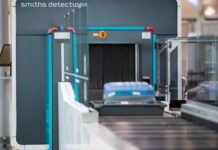
i-PRO Co., Ltd. (formerly Panasonic Security), a global pioneer in professional security solutions for surveillance and public safety, announced that the Arkansas Department of Corrections (DOC) has chosen to modernise its surveillance camera system with i-PRO network cameras and recorders. More than 4,000 cameras help the Arkansas DOC oversee 17,000 inmates and 32 facilities.
Working closely with system integrator Progressive Technologies, The Arkansas DOC has already replaced approximately 60% of their analog cameras with a mix of high-resolution i-PRO multi-sensor, fisheye, PTZ, bullet, dome, and compact dome cameras, and modernised their NVRs with i-PRO NX and NU recorders.
Arkansas DOC Containment and Surveillance Coordinator Drake Palmer talked about the impact of moving from analog to high-resolution digital cameras. “It’s like night and day. 4K is what allows us to see if someone’s handing an inmate a pen or a shank. We went from having blurry images to complete clarity. From a narrow field of view to a wide field of view. There are a hundred different things that these cameras have made easier and safer for inmates and staff.”
Reliability is also a must-have for the DOC in an environment hostile to technology. Cybersecurity is also a key concern, which is why they replaced existing IP cameras that lacked cybersecurity features at a facility they took over. At that site, Palmer brought in the easy-to-install i-PRO NU all-in-one recorder, took out the low-end cameras and recorder, deployed i-PRO cameras and the NU recorder and had everything up and running in 10 minutes.
At each of the DOC’s facilities, an officer monitors the video surveillance system on site. But with as many as 800 cameras on some sites, it’s impossible for one person to watch them all. Palmer anticipates taking advantage of i-PRO’s video analytics in the future to help with that. He is also exploring using line-crossing analytics to phase out the legacy microwave solution in place to surveil the facilities’ perimeters and identify/prevent contraband drops.
Licence plate recognition is also of interest to Palmer as a way to identify vehicles of interest that frequent the facilities. As the Arkansas DOC continues to modernise its surveillance system in phases, Palmer says, “We’ll be able to move gradually from reactive to proactive use of our camera system.”











